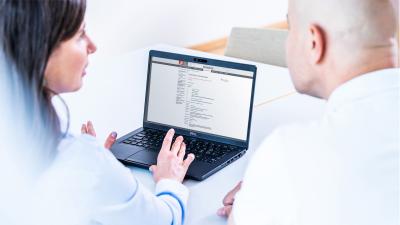SACEPO annual meeting fosters dialogue on quality actions, digital transformation and legal framework

On 1 July, the Standing Advisory Committee before the European Patent Office (SACEPO) convened online to exchange on developments in the European patent system. The annual meeting brought together 40 international experts from leading IP associations and industry federations, as well as European and international patent attorney associations. Topics discussed included quality, digital transformation, EPO IP Lab activities, AI, legal changes and the Unitary Patent. The session had a packed agenda and was highly interactive, featuring constructive discussions and exchanges on past and current quality actions.
Steve Rowan, EPO Vice-President Patent Granting Process, welcomed the participants and acknowledged the value of this annual meeting as a platform for open discussion on recent developments relating to the EPO’s key strategic priorities: "SACEPO is all about listening and learning from our users. It is about understanding what works and identifying areas where improvements are needed.”
The meeting was chaired by Christoph Ernst, EPO Vice-President Legal and International Affairs, who also noted the importance of maintaining open and constructive dialogue, reflecting the diverse views of the user community.
Focus on quality
SACEPO members welcomed the progress made on quality during the past year, highlighting the positive impact of the Active Search Divisions, which have led to observable improvements in search reports and written opinions. Members also agreed that the Quality Action Plan 2025 addresses relevant topics and expressed interest in maintaining an open dialogue on KPIs. They also acknowledged the Office’s efforts to enhance harmonisation, along with the impact of the Stakeholder Quality Assurance Panels, which will reconvene in October. Other SACEPO members called for continued progress in harmonisation, while the Japan Patent Attorneys Association highlighted the importance of timeliness.
Towards a fully digitalised patent granting process (PGP)
To date, the EPO has reduced its paper consumption from over 123 million sheets in 2019 to just 10 million in 2024, with further reductions expected. Overall, the progress made will significantly contribute to the EPO reaching carbon neutrality by 2030. While all SACEPO members agreed on the necessity of continuing to progress towards a fully digitalised PGP by 2027, some pointed out the need for fine-tuning to ensure inclusivity, so that SMEs would still have the option to use paper in clearly defined, exceptional circumstances. Legal changes to support fully electronic filing and notification are being prepared in close partnership with the user community.
Legal changes supporting digital transformation
Participants expressed support for the Office’s ongoing digitalisation efforts and forthcoming measures, including improved access to multimedia citations, the option to file colour drawings for European patent applications, and the transparency offered by new searchable databases for legal practitioners and associations. Some SACEPO members raised concerns about EPO listings of legal practitioners and professional representatives before the EPO, stressing the need for a clear distinction between the two. The EPO confirmed that the respective databases will be kept separate, based on clear qualification criteria. These exchanges followed the presentation of the remaining measures in the second basket of legal changes supporting digitalisation and simplification of the PGP. The Office also informed users of its preliminary considerations for a third basket of legal changes.
Unitary Patent: two-year review
The report on the first two years of Unitary Patent (UP) operations was warmly welcomed by SACEPO members. Key developments include a steady increase in uptake, with 28% of granted European patents now converted into Unitary Patents, the launch of the UP dashboard and Romania joining the system, making unitary protection now available in 18 participating EU Member States. Members were also informed of the implementation of the EU’s 14th package of sanctions against Russia in relation to EP and UP procedures and welcomed the publication of the first set of UP Guidelines in April. While the system was broadly praised, users also recognised the potential for greater uptake among applicants from outside Europe.
Update on EPO Observatory activities
The EPO's Observatory on Patents and Technology reported strong progress in its first year, launching studies and platforms on topics such as startup financing, universities, sustainable technology and health. It also expanded its outreach work beyond the IP community. In 2025, the Observatory further developed these activities and launched new ones on standard essential patents and public research organisations. It also continues to develop and improve digital tools such as the Deep Tech Finder and forthcoming Digital Library.
Report on IP Lab activities
SACEPO members received an overview of initiatives in areas such as convergence of practice, substantive patent law harmonisation (SPLH), and the planned new fee policy dashboard. The dashboard was well received and sparked a lively exchange, especially on its benefits for SMEs. One member suggested that post-grant annuity fees be addressed in future discussions. Regarding convergence of practice, the current working groups will soon complete their work on “broad claims” and “double patenting”. As of next year, an enhanced convergence dashboard will provide an overview of implementation across contracting states and access to detailed country-specific information.
Gradual evolution of the validation framework
SACEPO members were updated on the EPO's validation programme, which strengthens close co-operation between the European Patent Organisation and non-member states. Users expressed appreciation for the scheme, though feedback also indicated areas for further consideration.
Further leveraging AI in line with the EPO’s human-centric approach
Participants acknowledged the adoption of the EPO's new policy on the use of artificial intelligence (AI). In response to some concerns about the responsible use of AI, the Office reassured participants that quality remains paramount and that all decisions will continue to be taken by human actors. This forms part of the EPO’s human-centric approach.
The EPO’s policy provides a framework for secure and responsible AI adoption, supporting improvements in quality and efficiency of the European patent system for users while safeguarding fundamental rights. It also contributes to international best practice for IP offices, while aligning with the EU’s AI Act and Regulation 2024/1689.
Christoph Ernst closed the meeting by thanking members for their active and constructive engagement and reaffirmed the Office’s commitment to continuing structured dialogue with patent system users through SACEPO and all other channels.


